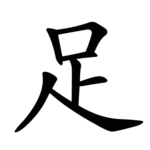Radical 157
Appearance
| 足 | ||
|---|---|---|
| ||
| 足 (U+8DB3) "foot" | ||
| Pronunciations | ||
| Pinyin: | zú | |
| Bopomofo: | ㄗㄨˊ | |
| Wade–Giles: | tsu2 | |
| Cantonese Yale: | juk1 | |
| Jyutping: | zuk1, zeoi3 | |
| Japanese Kana: | ショク shoku / ソク soku (on'yomi) あし ashi / たる taru (kun'yomi) | |
| Sino-Korean: | 족 jok | |
| Hán-Việt: | túc | |
| Names | ||
| Chinese name(s): | (Left) 足字旁 zúzìpáng (Bottom) 足字底 zúzìdǐ | |
| Japanese name(s): | 足/あし ashi (Left) 足偏/あしへん ashihen | |
| Hangul: | 발 bal | |
| Stroke order animation | ||
 | ||
Radical 157 or radical foot (足部) meaning "foot" is one of the 20 Kangxi radicals (214 radicals in total) composed of 7 strokes.
In the Kangxi Dictionary, there are 580 characters (out of 49,030) to be found under this radical.
足 is also the 158th indexing component in the Table of Indexing Chinese Character Components predominantly adopted by Simplified Chinese dictionaries published in mainland China.
Evolution
[edit]-
Bronze script character
-
Small seal script character
Derived characters
[edit]| Strokes | Characters |
|---|---|
| +0 | 足 |
| +2 | 趴 |
| +3 | 趵 趶 趷 趸SC (=躉) |
| +4 | 趹 趺 趻 趽 趾 趿 跀 跁 跂 跃SC (=躍) 跄SC (=蹌) |
| +5 | 跅 跆 跇 跈 跉 跊 跋 跌 跍 跎 跏 跐 跑 跒 跓 跔 跕 跖 跗 跘 跙 跚 跛 跜 距 跞SC (=躒) 践SC (=踐) |
| +6 | 践JP (=踐) 趼 跟 跠 跡 跢 跣 跤 跥 (=跺) 跦 跧 跨 跩 跪 跫 跬 跭 跮 路 跰 跱 跲 跳 跴 跶SC (=躂) 跷SC (=蹺) 跸SC (=蹕) 跹SC (=躚) 跺 跻SC (=躋) |
| +7 | 跼 跽 跾 跿 踀 踁 (=脛 -> 肉) 踂 踃 踄 踅 踆 踇 踈JP (=疏 -> 疋) 踉 踊SC (=踴) 踋 踌SC (=躊) 踍 踎 |
| +8 | 踏 踐 踑 踒 踓 踔 踕 踖 踗 踘 (=鞠 -> 革) 踙 踚 踛 踜 踝 踞 踟 踠 踡 踢 踣 踤 踥 踦 踧 踨 踩 踪SC/JP (=蹤) 踬SC (=躓) 踭 踮 踯SC (=躑) 踺 |
| +9 | 踫 (=碰 -> 石) 踰 (=逾 -> 辵 / 窬 -> 穴) 踱 踲 踳 踴 踵 踶 踷 踸 踹 踻 踼 踽 踾 踿 蹀 蹁 蹂 蹃 蹄 蹅 |
| +10 | 蹆 蹇 蹈 蹉 蹊 蹋 蹌 蹍 蹎 蹏 (=蹄) 蹐 蹑SC (=躡) 蹒SC (=蹣) 蹓 |
| +11 | 蹔 (=暫 -> 日) 蹕 蹖 蹗 蹘 蹙 蹚 蹛 蹜 蹝 蹞 (=跬) 蹟 (=跡) 蹠 (=跖) 蹡 蹢 蹣 蹤 蹥 蹦 蹧 (=糟 -> 米) 蹮 躀 |
| +12 | 蹨 蹩 蹪 蹫 蹬 蹭 蹯 蹰SC (=躕) 蹱 蹲 蹳 蹴 蹵 (=蹴) 蹶 蹷 蹸 蹹 蹺 蹻 蹼 蹽 蹾 蹿SC (=躥) |
| +13 | 躁 躂 躃 躄 躅 躆 躇 躈 躉 |
| +14 | 躊 躋 躌 (=䟼) 躍 躎 躏SC (=躪) |
| +15 | 躐 躑 躒 躓 躔 躕 躖 |
| +16 | 躗 躘 躙 躚 躛 躜SC (=躦) |
| +17 | 躝 躞 躟 躠 |
| +18 | 躡 躢 躣 躤 躥 |
| +19 | 躦 躧 |
| +20 | 躩 躪 |
| +21 | 躨 |
Sinogram
[edit]The radical is also used as an independent Chinese character. It is one of the Kyōiku kanji or Kanji taught in elementary school in Japan.[1] It is a first grade kanji[1]
References
[edit]- ^ a b "The Kyoiku Kanji (教育漢字) - Kanshudo". www.kanshudo.com. Archived from the original on March 24, 2022. Retrieved 2023-05-06.
Literature
[edit]- Fazzioli, Edoardo (1987). Chinese calligraphy : from pictograph to ideogram : the history of 214 essential Chinese/Japanese characters. calligraphy by Rebecca Hon Ko. New York: Abbeville Press. ISBN 0-89659-774-1.
External links
[edit]Wikimedia Commons has media related to Radical 157.


